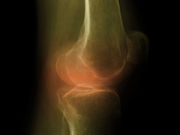Improvement in pain at one month; decrease in global WOMAC score in eight patients after GAE
MONDAY, March 19, 2018 (HealthDay News) — Minimally invasive, image-guided geniculate artery embolization (GAE) is associated with reduction in pain and disability for knee osteoarthritis (OA) that is refractory to conservative therapy, according to a study presented at the annual meeting of the Society of Interventional Radiology, held from March 17 to 22 in Los Angeles.
Sandeep Bagla, M.D., from the Vascular Institute of Virginia in Woodbridge, and colleagues published interim results from a prospective U.S. multicenter clinical trial involving 20 subjects with OA with pain greater than 50 mm that was refractory to conservative therapy. Thirteen subjects underwent GAE using 75 or 100 µm microspheres at two U.S. centers. Before and after the procedure, subjects underwent magnetic resonance imaging and were assessed with the visual analogue scale (VAS) and Western Ontario and McMaster University Osteoarthritis Index (WOMAC) pain and disability scales.
The researchers found that in all 13 cases, neovascularity was identified in the area of pain by arteriography, and GAE was technically successful. Eight of the subjects were eligible for clinical follow-up. There was a significant improvement in pain at one month as measured by VAS in association with GAE. There was also a decrease in global WOMAC score. No procedure-related major adverse events occurred.
“We are very encouraged by the results and the implications for the millions suffering from this common, yet debilitating condition,” Bagla said in a statement.
Copyright © 2018 HealthDay. All rights reserved.








